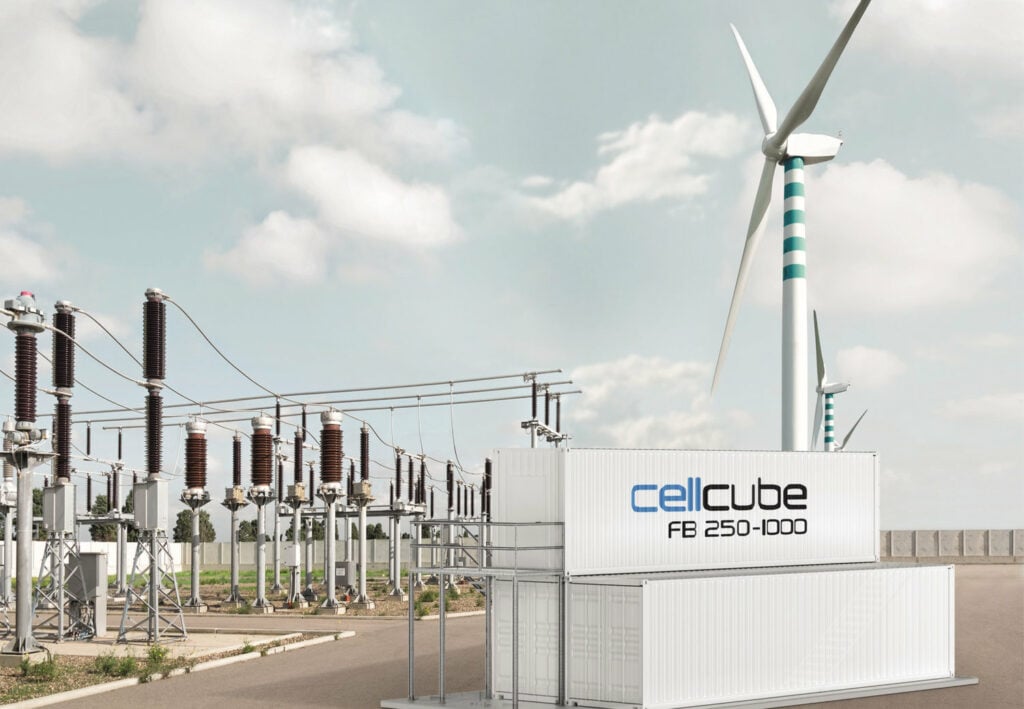
European vanadium flow battery brand CellCube has formed an R&D partnership in Australia in anticipation of establishing a presence in the country’s long-duration energy storage market.
CellCube is the trading/brand name for Austria-headquartered technology provider Enerox. The company has partnered with BESS Research, a researcher of battery configurations.
Enjoy 12 months of exclusive analysis
- Regular insight and analysis of the industry’s biggest developments
- In-depth interviews with the industry’s leading figures
- Annual digital subscription to the PV Tech Power journal
- Discounts on Solar Media’s portfolio of events, in-person and virtual
The two will collaboratively work out how CellCube vanadium redox flow batteries (VRFBs) could help meet the need for 24/7 low carbon energy in Australia, beginning with a pilot deployment of a 2MW/8MWh VRFB system.
The companies anticipate being able to develop and roll out a localised version of the CellCube VRFB system for the Australian market, claiming it could be ready and on sale by H2 2023. They will initially target the commercial and industrial (C&I) microgrid segment that CellCube is also pursuing opportunities in elsewhere in the world.
CellCube said C&I entities in Australia are actively looking for energy storage with duration in excess of four hours to enable decarbonisation of their operations.
The company anticipates marketing the flow battery technology, which it considers to be durable as well as long duration, to customers with industrial facilities located in remote areas with harsh climates and a need for versatile energy storage that can perform multiple applications.
BESS Research will procure the necessary parts, software, and service solutions for the pilot deployment from CellCube and could adapt or add elements to the VRFB design to meet specific needs of the Australian market.
Flow battery R&D at the forefront
Being able to source and scale raw materials and component supply is an important aspect of commercialising any technology and although the vanadium flow battery was actually invented in Australia, Windimurra – the country’s only working vanadium mine – went out of business some years ago.
Located in Western Australia, the co-developer of that plant is actually involved in the new VRFB partnership. Andrew McKee is now managing director at Nanomem, a membrane technology company.
Nanomem is helping CellCube and BESS Research to improve the proton exchange membrane that forms a key part of the VRFB system design as well as securing localised vanadium electrolyte supply.
It has also been a stated aim of the national and various state governments of Australia to develop expertise and an industrial base for manufacturing batteries, including lithium-ion and flow batteries.
That was the case even before the recent election of climate-friendly Prime Minister Anthony Albanese of the Labor Party, who set Australia’s first national clean energy targets, aiming for 82% renewables by 2030.
With government financial support disbursed to support those efforts, various entities have been developing both vanadium production, processing and electrolyte manufacturing facilities in the country. CellCube formed an agreement with one of those, Australian Vanadium, in 2020.
That said, perhaps the best-known flow battery company based in Australia so far is Redflow, which makes systems based on zinc bromine electrolyte, not vanadium pentoxide.
“We are facing a high demand for double-digit megawatt storage systems in remote areas,” Nanomem’s Andrew McKee said.
“Australian customers want to see a successful proof of concept project with a megawatt battery storage delivering power and energy for multiple hours – a complete storage technology covered by bankable performance guarantees and with the ability to leverage finance through power purchase agreements (PPAs).”
Other markets CellCube is targeting include the US. Towards the beginning of this year the company agreed a five-year vanadium electrolyte supply deal with producer US Vanadium. CellCube set up a US subsidiary in May and announced a 2MW/8MWh C&I microgrid project in Illinois a couple of months later.
In May, CellCube signed a 1GW, five-year VRFB deployment agreement with South African energy asset developer Kibo Energy. South African primary vanadium producer Bushveld Minerals’ energy storage subsidiary also holds a stake in the VRFB player.
“We are excited that the Australian government has put R&D at the forefront of their financial support to strengthen the localisation of technology and production to achieve net-zero with an Australian value chain. This cooperation follows our business strategy to establish regional offerings and working with local supply chain partners to build megawatt microgrids in our key markets,” Alexander Schoenfeldt, Enerox/CellCube CEO said.
“As started in North America and South Africa, we are now keen to start business in Australia and, as such, mobilising key staff to build local knowledge and teams and value in Australia for the Australian market.”






